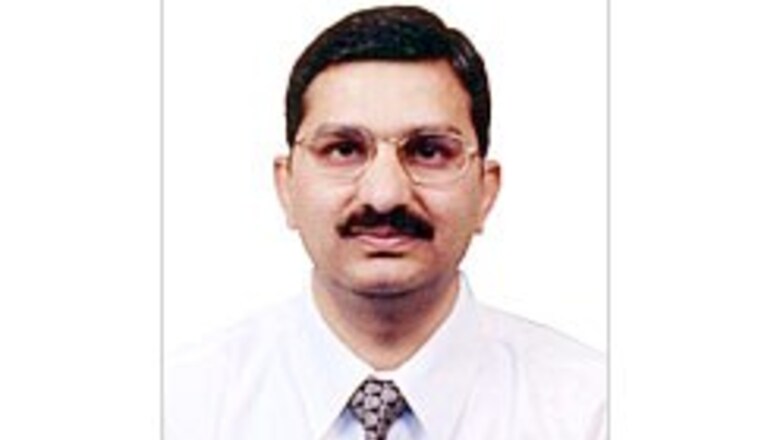
views
As the D-Day approaches, India Inc has its wishlist in place. And for the IT industry, recession in the US is a big worry.
How will a weakening dollar affect things in India? Will the IT industry get any sops? What kind of growth lies in store for the industry?
To find out all the answers, IBNLive.com organised an online chat with Sharad Heda, Chief Operating Officer, Microland.
Here we reproduce the full text of his chat.
Rafi.C: How much will the IT sector help in boosting the Indian economy by 2010?
Sharad Heda: IT sector’s share in India’s GDP will continue to increase. More importantly, it would help other companies become a lot more efficient, drive government initiatives, generate secondary and tertiary employment too... the ecosystem impact is really significant but can’t be measured easily.
Amol Wade: Today some IT companies are cutting jobs, VPPs and yet say all this won’t impact employees. What, according to you, is going to be the trend?
Sharad Heda: Corporates would take decisions based on their strategy and business situation. I do not see a trend as you mentioned, except that performance would be watched closely by all, considering profitability pressures.
Vipin: With an expected squeeze in the numbers for IT firms on the horizon, what fundamentals should companies focus on in the coming year?
Sharad Heda: Delivering exceptional value to the customers and harnessing talent – I believe these would be critical.
Venkatesan S: Your industry has been given lots of sops by the Govt, isn't it high time now you give back to the country by helping the banking and Govt sectors in computerising all the sectors so that it benefits everybody? And after doing this, you can expect a tax benefit for IT companies. i.e. you need NASSCOM to form a committee and then help the Central and State to computerise on BOT basis, the money comes to the NASSCOM, which then transfers to the industry. In this way, some of the SEs are employed and the committee maintains this. The variable of the project is left for NASSCOM, but by doing this all the Indians will be benefitted. Do you think we can do similar projects in educating the people in each village through the internet with the help of SE? In this way IT companies do not wither under dollar vs rupee scene nor do they face slowdown in orders from US. Your comments!
Sharad Heda: I think the biggest area where IT industry can contribute is in the education sector. It’s a crying need for society, and our literacy levels are nowhere close to our neighbours. And industry sees synergy in this as it is driven by talent.
Raj: Some time back, the health minister had kicked up a row , commenting on the "lifestyle" of BPO employees. What is your comment? How do such reports play up in the international market?
PAGE_BREAK
Sharad Heda: Corporate world follows politics closely, but takes it decisions based on rational factors and business benefits. These reports play up in the market, but do not impact business much. Nasscom also ensures it projects the India story to the other countries strongly, including the BPO story.
Ram Bharose: Do you think that the IT sector is overrated in India? Should companies build capabilities in India or should they focus abroad?
Sharad Heda: India is clearly a global hub for services, especially for the knowledge sector. One can look at other geographies to complete the story, but you can’t be in IT as a significant player by ignoring India.
Santosh Kunder: What should the Indian IT companies expect from the Finance Minister to help them cope up with the sliding dollar rates?
Sharad Heda: I think IT companies need to find their own solutions to this in the medium and long term. It can expect some relief by extending STPI scheme in the short term.
Mritunjoy: Do you think this Budget might have some benefit for IT organizations moving to Tier 2 cities to create a win-win situation for both?
Sharad Heda: I wish it does , though my guess is that there won’t be any specific push.
Sam: Will Indian IT salaries continue to rise at unprecedented levels or do you think we'll see a slackening in that growth rate?
Sharad Heda: I do not see a heady growth in IT salaries , as I do not think profits of IT companies would have the same heady growth as in last few years. Having said that, specialised skills and high performance would continue to be at premium and such employees would continue to get what they want.
Sam: Do you think sops are required to keep IT industry growth rates as high as they have been?
Sharad Heda: IT industry has reached a very significant size and hence logically, growth rates on this base would be lesser. Also, SOPs support profitability more and not growth rates.
Bartik Acharya: Sharad, appreciate your positive thought on the Income Tax question. My next googly to you is, how do you expect the share market to react to this Budget considering the current trend and the way the Reliance IPO was given such a shoddy treatment on listing?
Sharad Heda: Frankly, I won’t hazard a guess on this... If I had a clear idea, I would be investing in or selling shares.
PAGE_BREAK
Amol Wade:Business is ruthless, competition is high, expectations do not stop – what would be your message to the young leaders?
Sharad Heda: Believe in yourselves. The environment is same for all. Expect more from yourself and work diligently to realise your dreams, there is no reason why you should not scale greater heights.
Vipin: Keeping in mind the weakening dollar and the increasing cost of human capital in the Indian Spectrum, how long do you feel this boom of the IT/ITES business will last in India? Also what could be done to prolong the same, keeping both cost and competition in mind?
Sharad Heda: I am a strong believer in the capability of the Indian entrepreneur. If the dollar is weakening, Indian companies would accelerate the move to higher value add services. If the cost of people is zooming, the industry is already looking at employing non-engineering science graduates to reduce costs for lower-end services. New challenges are part of any business world, it’s just that we are seeing several challenges being thrown at the same time on the IT world. I see the industry emerging relatively unaffected in the long run, but short term would be painful for most companies.
Bartik Acharya: The salaried class is always the easy "bakra" for any FM while taxing the masses. Do you feel that this time we can expect a change considering that the IT payees have now grown to a comfortable number?
Sharad Heda: I see some relief for the lower income slab employees as a distinct possibility since we have elections coming up soon . May be some change related to ESOPs and FBT and withdrawal of cess to reducing effective tax rates. Some of these may find way in the Budget and I hope it happens that way.
Kishan: What is the future of IT in India?
Sharad Heda: Very bright. Indian corporates are growing to become billion dollar companies, domestic economy is booming at near 10% GDP growth, e-governance initiatives are gaining root. We have seen only the tip of the iceberg.
Naveen: How do you feel the infrastructure outsourcing will benefit from this Budget?
Sharad Heda: I am not sure whether infrastructure outsourcing would have any direct relation with budget proposals. Fortunately, it does not need any push and already has a strong momentum. It is estimated to become much larger than some established IT service lines and experience growth of over 50% CAGR for next few years. If the industry does its job well in innovating and driving customer satisfaction, there is no stopping this sector.
PAGE_BREAK
Amol Wade: What should be the key focus areas on achieving cost savings?
Sharad Heda: Three possible initiatives for most companies – look at talent pool beyond engineering graduates , look at Tier 2 cities , drive automation and utilisation.
Mohan: Will there be any benefits for BPOs? Do you think there will be any tax benefits?
Sharad Heda: The BPO industry in India is seen as an extension of IT services industry from fiscal support perspective. Hence, any benefit would need to be seen along with software services from a govt perspective. I think the best bet is extension of STPI scheme by a few years.
Bhakti M: First the dotcom crash, now global recession on its way. How long do you think the outsourcing can sustain itself from crash?
Sharad Heda: These are actually opportunities for the offshoring world. The dotcom crash led to several cost cutting initiatives and recession would drive the same behavior.
Shrinivas Kulkarni: Will tax sops for IT-ITES under 10A/10B extend beyond 09?
Sharad Heda: I sincerely wish they are extended for at least 5 years. The industry would like to focus all energies on addressing impact of USD depreciation and US recession and people cost increases for next couple of years.
Arun: Let's cut to the chase: how will this Budget affect compensations in the IT sector?
Sharad Heda: I do not see it impacting compensation much. The drivers of compensation are more with the industry players and the industry is not expecting much in the Budget. There may be some support to ESOPs in relation to the FBT though.
Ram bharose: What qualities do you think are required to be a competitive player in IT today?
Sharad Heda: We need to be lot more innovative in finding answers to the ever-evolving business climate (dollar depreciation and US recession were not even dreamt of 15 months ago), find answers to breaking the linear equations of headcount and revenue through IP and tools and start looking at delivering business solutions than just technical solutions as that increases pricing power.
PAGE_BREAK
Biswadeep: Apart from improving resource utilisation and reducing overheads, what else can the IT sector do to sustain the growth?
Sharad Heda: I see three critical initiatives – move to higher value-add components in software services, get into new service lines such as Remote Infrastructure management and testing services which are expected to grow at 50%+ CAGR for next several years and Focus on the booming Domestic IT market.
Vinay: Do you think the Budget will do anything to ease the effects of impending recession in the US on the Indian IT industry?
Sharad Heda: The focus of the Budget is more to look at Indian economy and its challenges. Since Indian economy is primarily driven by domestic demand, the pressure on FM to look at US recession and take actions is relatively low. Further, we have elections coming in and that’s a bigger driver for Budget directions. Some specific support such as STPI scheme extension may be looked at though.
Tenzin Bhutia: With the dollar price weakening, will there be any effects on the IT sector?
Sharad Heda: Certainly, the price pressures would impact margins in the short term. It would be interesting to watch how do currencies of other economies appreciate vis-à-vis USD as that would determine how much we are at a relative disadvantage. I also believe that in medium and long term, Indian IT industry will find solution to the currency issue – whether it involves tapping science graduates to reduce costs for low-end services.
Sandhya: Though Gartner predicts that there will not be a slack in the IT sector, there is a heavy economic crisis in the US which would gradually affect the outsourcing market. Could you tell what’s the future of IT/ ITES/ BPOs?
Sharad Heda: Generally, recession is both a threat and opportunity . There would be higher price pressures but significantly higher volume of business as customers would offshore a lot more. This is exactly what happened when the dotcom crash hit the corporate world. Another positive development is that new service lines such as Remote Infrastructure management and product design are gaining momentum and these are expected to grow at 50 per cent+ CAGR for next few years. Lastly, the US recession is not expected to last much more than 12 months. Overall, am in agreement with Gartner estimates.




















Comments
0 comment